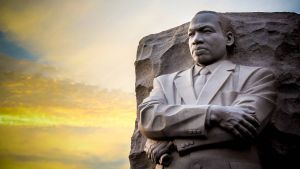Supreme Court Justice Ruth Bader Ginsburg, who served on the nation’s highest court for 27 years, passed away Friday, Sept. 18 at the age 87.
“As the second woman ever to sit on the highest court in the land, she was a warrior for gender equality — someone who believed that equal justice under law only had meaning if it applied to every single American,” said former President Barack Obama in a statement. “Over a long career on both sides of the bench — as a relentless litigator and an incisive jurist — Justice Ginsburg helped us see that discrimination on the basis of sex isn’t about an abstract ideal of equality; that it doesn’t only harm women; that it has real consequences for all of us. It’s about who we are — and who we can be.”
In remarks to reporters after learning of her death, former Vice President Joe Biden added: “Ruth Bader Ginsburg was not only a giant in the legal profession but a beloved figure, and my heart goes out to all those who cared for her and care about her. She practiced the highest American ideals as a Justice — equality and justice under the law. Ruth Bader Ginsburg stood for all of us.”
“Flags are flying at half-staff over the Capitol to honor the patriotism of Justice Ruth Bader Ginsburg,” House Speaker Nancy Pelosi tweeted after the news broke. “Every woman and girl, and therefore every family, in America has benefitted from her brilliance.”
Related: Supreme Court Blocks Trump’s Attempt to End DACA
What’s at Risk in a Supreme Court without RBG on the Bench
As the senior member and de facto leader of The Supreme Court’s four-justice liberal bloc, Ginsburg consistently fought for fair and equal treatment for all, regardless of gender, race or sexual orientation. Without her presence on the bench, countless progressive movements heading before the Supreme Court could be at risk. Among them:Among them:
Reproductive rights
Without Ginsburg’s reliable liberal vote and her consistent voice for reproductive rights, many experts worry about the future of the Roe v. Wade decision that legalized abortion nationwide in 1973. According to the Center for Reproductive Rights, over 450 laws designed to restrict, impede or deny a woman’s legal right to abortion have been passed by state legislatures across the country since 2011. Abortion rights supporters won an unexpected victory in June 2020 when the court struck down a Louisiana law that could have potentially down most abortion clinics in the state. In that case, Chief Justice John Roberts cast the swing vote in the decision, siding with the majority. However, his views on the subject don’t appear to be set, having dissented in a similar 2016 case from Texas that required doctors who perform abortions to have hospital admitting privileges. In other words, there’s no clear precedent as to how he could vote on the subject in the future. “The fate of our rights, our freedoms, our health care, our bodies, our lives, our country literally depends on what happens over the coming months,” warns Planned Parenthood Action Fund President Alexis McGill Johnson.
The rights of immigrants
In June 2020, Chief Justice Roberts joined liberals including Ginsburg in a surprising, 5-4 decision rejecting President Trump’s attempt to end Deferred Action for Childhood Arrivals (DACA), the Obama program protecting so-called DREAMers. While the chief justice still falls in line with his Republican-appointed colleagues in most cases, he also voted with the court’s more liberal members last year in a 5-4 ruling that overturned President Trump’s move to add a citizenship question to the 2020 census. Immigration issues could again be in front of the court very soon: just last week, Trump instructed the Commerce Department to exclude undocumented immigrants from the census count when it comes to congressional reapportionment. The move was blocked by a federal court earlier this month. A 4-4 ruling by a short-handed court could keep the lower court’s ruling in place, but a new justice on the bench or change in opinion from Chief Roberts could topple the previous court’s verdict.
Healthcare for millions of Americans
Outside of COVID 19-related matters that might spring up, the highest-profile case the Supreme Court is set to take up this fall is a broad, Trump administration-backed challenge to Obamacare. It’s currently scheduled to be argued one week after Election Day. With four liberals on the court, Roberts was seen as a potential swing justice who might be able to save the law. (This seemed especially likely given his key role in the court’s 2012 5-4 decision that saved the program’s individual mandate.) However, should Roberts again side with the liberals, the resulting 4-4 tie decision would leave in place the lower court ruling which declared the law invalid.
The results of the 2020 election
Many legal pundits warn of potential nightmare scenarios that could be brought about by the upcoming election. With numerous court challenges underway across the country concerning mail-in ballots and other COVID 19-related changes to voting procedures, plus the threat of unexpected legal disputes that may arise from extremely close or disputed election results, a change in the ideological balance of the high court could drastically impact the outcome of not just the 2020 Presidential race but any number of down-ballot elections as well. These battles may rage on long after Election Day, meaning that even if a new justice doesn’t take the bench until after the election, his or her appointment could still drastically impact final results. And should voting carry on without a new justice in place, the resulting Supreme Court decisions could be just as unpredictable for both Republicans and Democrats alike. In 2014, Chief Justice Roberts joined with the court’s liberals and Kennedy to block a GOP-backed voter ID law from taking effect in Wisconsin shortly before the election. In April 2020, Roberts sided with the court’s conservative bloc in a 5-4 decision that overturned a COVID-19-related federal court order that would have allowed Wisconsin voters to return ballots after Election Day. And in August 2020, Roberts appeared to side with the court’s four liberals and Justice Brett Kavanaugh in refusing a Republican Party request to block a plan in Rhode Island to keep waiving certain security measures for absentee ballots due to the pandemic.
What other issues might arise and where the resulting votes may fall in the type of unprecedented year we’re currently experiencing is anyone’s guess. All that’s certain is that whatever happens, and wherever 2020 continues to progress, the voice and presence of the honorable Ruth Bader Ginsburg in our nation’s highest court will be severely missed,
Remembering a Legend
Ginsburg was appointed a Supreme Court Justice in 1993 under President Bill Clinton. In 1996, she wrote the majority opinion in one of her most notable cases, United States v. Virginia, which became a milestone for women’s rights and university admissions. The case challenged the Virginia Military Institute, which did not admit women. The state of Virginia offered to create a separate educational program for women attending the military institute, but the court ruled that denying women the same education as men was denying them equal protection under the law. “Women seeking and fit for a VMI-quality education cannot be offered anything less, under the Commonwealth’s obligation to afford them genuinely equal protection,” Ginsberg concluded.
In the 1999 case, Olmstead v. L.C., Ginsburg took part in a ruling that advocated for the rights and autonomy of people with disabilities; two women with disabilities were ordered to remain in a psychiatric facility despite physicians saying they were fit to live in a community-based program. In the majority opinion, Ginsburg wrote that states shall be required to place individuals with mental disabilities in community programs when doctors have decided the person is capable of living in a less-restrictive setting and the individuals’ needs can be reasonably accommodated.
In a landmark win for same-sex couples in 2015, Ginsburg ruled in favor of legalizing gay marriage nationwide. In this case, several same-sex couples sued their respective states over bans against marriage equality. The decision legalized same-sex marriage across all states. In her oral arguments, Ginsberg discussed the changing ideas of marriage. “Marriage today is not what it was under the common law tradition, under the civil tradition,” she said. “Marriage was a relationship of a dominant male to a subordinate female. That ended as a result of this court’s decision in 1982 when Louisiana’s Head and master Rule was struck down. And no state was allowed to have such marriage anymore.”
In 2016, Ginsberg’s vote helped strike down a Texas law, H.B.2 that imposed a number of restrictions on abortion clinics under the guise of protecting against health risks when it was really an attempt to deter people from receiving abortions. In Whole Woman’s Health v. Hellerstedt, the Court ruled that the law placed an undue burden on women’s rights. “It is beyond rational belief that H. B. 2 could genuinely protect the health of women, and certain that the law ‘would simply make it more difficult for them to obtain abortions,’” Ginsburg wrote, concurring with the majority.
It was Ginsburg’s dissent in the case of 2007’s Ledbetter v. Goodyear Tire & Rubber Co. however, that led to one of her most significant legacies. In the case, Lily Ledbetter, who worked at a Goodyear Tire facility in Alabama for 19 years, alleged that she had been paid less than what her male counterparts were receiving, even though she had more experience than many of them. Despite the obvious pay discrimination, the court sided with Goodyear not because they had been wrong in their actions but because Ledbetter had waited too long to sue. Railing against the all-male, 5-4 majority vote, Ginsburg delivered a scathing dissent, accusing the eight male justices of being indifferent to the gender pay gap. “The Court does not comprehend or is indifferent to the insidious way in which women can be victims of pay discrimination,” she said, calling upon Congress to act where the court had not.
Subsequently, the 111th United States Congress passed the Lilly Ledbetter Fair Pay Act in 2009, which President Obama then signed into law as his first official piece of legislation after taking office.


















